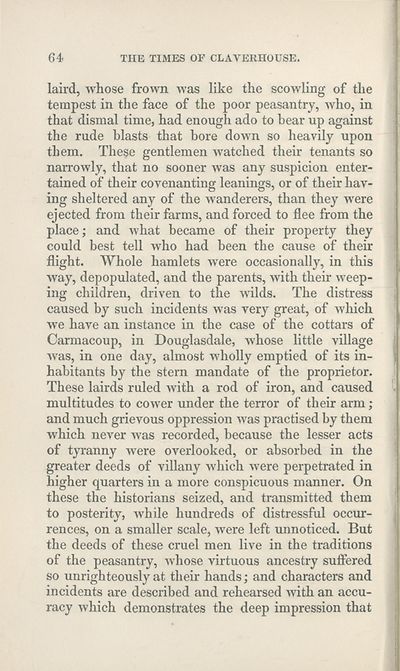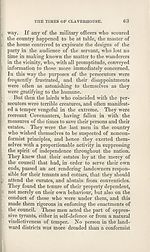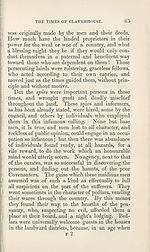Download files
Complete book:
Individual page:
Thumbnail gallery: Grid view | List view

64
THE TIMES OF CLAVERHOUSE.
laird, whose frown was like the scowling of the
tempest in the face of the poor peasantry, who, in
that dismal time, had enough ado to bear up against
the rude blasts that bore down so heavily upon
them. These gentlemen watched their tenants so
narrowly, that no sooner was any suspicion enter¬
tained of their covenanting leanings, or of their hav¬
ing sheltered any of the wanderers, than they were
ejected from their farms, and forced to flee from the
place; and what became of their property they
could best tell who had been the cause of their
flight. Whole hamlets were occasionally, in this
way, depopulated, and the parents, with their weep¬
ing children, driven to the wilds. The distress
caused by such incidents was very great, of which
we have an instance in the case of the cottars of
Carmacoup, in Douglasdale, whose little village
was, in one day, almost wholly emptied of its in¬
habitants by the stern mandate of the proprietor.
These lairds ruled with a rod of iron, and caused
multitudes to cower under the terror of their arm;
and much grievous oppression was practised by them
which never was recorded, because the lesser acts
of tyranny were overlooked, or absorbed in the
greater deeds of villany which were perpetrated in
higher quarters in a more conspicuous manner. On
these the historians seized, and transmitted them
to posterity, while hundreds of distressful occur¬
rences, on a smaller scale, were left unnoticed. But
the deeds of these cruel men live in the traditions
of the peasantry, whose virtuous ancestry suffered
so unrighteously at their hands; and characters and
incidents are described and rehearsed with an accu¬
racy which demonstrates the deep impression that
THE TIMES OF CLAVERHOUSE.
laird, whose frown was like the scowling of the
tempest in the face of the poor peasantry, who, in
that dismal time, had enough ado to bear up against
the rude blasts that bore down so heavily upon
them. These gentlemen watched their tenants so
narrowly, that no sooner was any suspicion enter¬
tained of their covenanting leanings, or of their hav¬
ing sheltered any of the wanderers, than they were
ejected from their farms, and forced to flee from the
place; and what became of their property they
could best tell who had been the cause of their
flight. Whole hamlets were occasionally, in this
way, depopulated, and the parents, with their weep¬
ing children, driven to the wilds. The distress
caused by such incidents was very great, of which
we have an instance in the case of the cottars of
Carmacoup, in Douglasdale, whose little village
was, in one day, almost wholly emptied of its in¬
habitants by the stern mandate of the proprietor.
These lairds ruled with a rod of iron, and caused
multitudes to cower under the terror of their arm;
and much grievous oppression was practised by them
which never was recorded, because the lesser acts
of tyranny were overlooked, or absorbed in the
greater deeds of villany which were perpetrated in
higher quarters in a more conspicuous manner. On
these the historians seized, and transmitted them
to posterity, while hundreds of distressful occur¬
rences, on a smaller scale, were left unnoticed. But
the deeds of these cruel men live in the traditions
of the peasantry, whose virtuous ancestry suffered
so unrighteously at their hands; and characters and
incidents are described and rehearsed with an accu¬
racy which demonstrates the deep impression that
Set display mode to:
![]() Universal Viewer |
Universal Viewer | ![]() Mirador |
Large image | Transcription
Mirador |
Large image | Transcription
| Antiquarian books of Scotland > Crime & punishment > Times of Claverhouse, or, Sketches of the persecution > (76) |
|---|
| Permanent URL | https://digital.nls.uk/135012887 |
|---|
| Description | Thousands of printed books from the Antiquarian Books of Scotland collection which dates from 1641 to the 1980s. The collection consists of 14,800 books which were published in Scotland or have a Scottish connection, e.g. through the author, printer or owner. Subjects covered include sport, education, diseases, adventure, occupations, Jacobites, politics and religion. Among the 29 languages represented are English, Gaelic, Italian, French, Russian and Swedish. |
|---|

